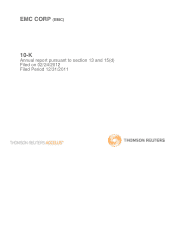EMC 2011 Annual Report Download - page 5
Download and view the complete annual report
Please find page 5 of the 2011 EMC annual report below. You can navigate through the pages in the report by either clicking on the pages listed below, or by using the keyword search tool below to find specific information within the annual report.
Table of Contents
compute resources that any application can access. Next, through increased automation the infrastructure can be less dependent on administrators. Automation
not only makes things more efficient, it makes things faster and more reliable. The business can now consume IT "as a service" and understand what is being
delivered, at what service level and how much it costs.
We believe that most companies will first build a "Private Cloud" inside their own data center – consolidating, standardizing, virtualizing and then
automating much of their existing infrastructure and running many of their existing applications. Over time, we believe there will be a number of "Public
Clouds" delivered by trusted service providers able to run business applications at a lower cost than some IT departments. IT departments will come to rely on
both Private Cloud and Public Cloud infrastructures for their operations – something that we call a "Hybrid Cloud".
Companies will choose to go with EMC for Hybrid Cloud Computing for three reasons. We believe we can deliver the greatest improvements in
efficiency of the IT infrastructure; we provide IT with a solution which leaves them in control of their critical data and applications; and, finally, we offer the
customer choice – they can retain an open architecture with an ability to run any application on any infrastructure.
Big Data Transforms Business
The continued growth of data in the digital universe creates a huge challenge for IT departments who must store and manage information – and do so
with only an estimated 1.5 fold increase in their staffing by 2020 according to industry experts. But this Big Data also creates huge opportunities for
organizations who can turn all of this data into insightful information and deliver it to business users in a timely fashion.
Many modern business critical systems have now been in place for upwards of a decade and have delivered huge increases in productivity as they
automate the everyday work of many employees. Many of these business systems have amassed tens or hundreds of terabytes of data – stored, managed and
protected in many cases by EMC's storage infrastructure. But the biggest growth in data is not occurring in these business systems – it's occurring in
unstructured data such as files, videos and web logs. Unstructured data rapidly grows within organizations to petabyte scale and is not suitable to be stored,
managed and analyzed by traditional IT systems.
To capitalize on the opportunity that Big Data presents, IT departments must acquire new technology, build new applications and serve insightful
information up to business users in a relevant and visually appealing way. This new technology must be designed to operate at petabyte scale – employing a
"scale-out" architecture. Software must be able to operate in a massively parallel way to enable vast quantities of data to be ingested and analyzed in a timely
fashion. Finally, new business applications must be able to be built rapidly and serve up information so that business users can make informed decisions and
take action.
Products and Services
EMC's strategy is to provide the products and services that customers need to realize the benefits of moving to Cloud Computing, unlock the
opportunities hidden in vast quantities of Big Data and do so in a safe and trusted way. Whether customers are expanding their traditional data centers,
embracing a virtual data center or broader Cloud Computing and IT-as-a-Service models, EMC's broad portfolio aims to meet their needs through every phase
from initial assessment to design, delivery and implementation.
EMC Information Infrastructure Products and Offerings
Information Storage Segment
EMC offers a comprehensive portfolio of enterprise storage systems and software – including high-end EMC VMAX and mid-tier EMC VNX primary
storage and a portfolio of backup products that support a wide range of enterprise application workloads. EMC's two additional storage families, EMC Isilon
and EMC Atmos, are specifically designed to handle vast quantities of unstructured, or "Big Data." As the foundation of an information infrastructure within
traditional data centers, virtual data centers and cloud-based IT infrastructures, EMC storage systems can be deployed in storage area networks (SAN),
networked attached storage (NAS), unified storage combining NAS and SAN, object storage and/or direct attached storage environments.
Customer adoption of EMC's storage products and offerings in 2011 was driven by storage innovations, new features and capabilities, and a focused
emphasis on expanding EMC's partner ecosystem. All EMC storage arrays leverage the latest Intel processor technology, designed to consume less energy
than alternative solutions and optimized for virtual environments. EMC has more than 75 integration points between EMC and VMware products, which is
critical to customers managing and optimizing their storage in virtual data centers. VMware integration continues to be a key competitive differentiator and
enabler for EMC, helping customers realize the potential of transforming their IT and virtual infrastructures.
4


















